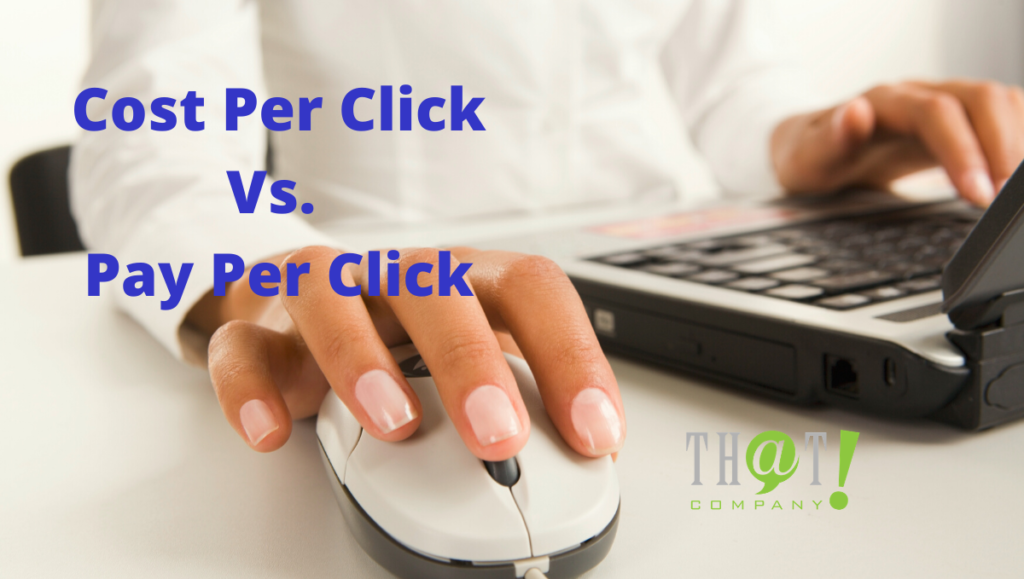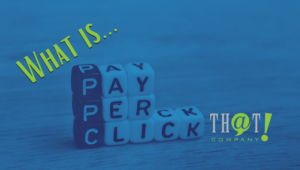
In today’s paid digital marketing world, there are constant updates that we must stay on top of to be familiar with current terminology and the digital landscape. The acronyms PPC vs. CPC that appear above get confused all the time. I am going to break down the difference between the two for you and give you PPC simplified. PPC stands for Pay-Per-Click, and CPC stands for Cost-Per-Click. These two terms sound similar but are different. You can think of Pay-Per-Click as the overall category and Cost-Per-Click as being a part of the PPC strategy and PPC process.
What is Pay-Per-Click (PPC)?
 First, PPC is just like the name says. Every time someone clicks on your ad, you pay to whichever online digital advertising you are using, such as Google Ads, Facebook Ads, Instagram Ads, Microsoft Ads, Amazon Ads, and more. Many agencies want you to automate your PPC campaigns, but I have supplied reasons for why you don’t want to automate your Google Ads PPC campaigns in an earlier blog post. Each paid digital marketing platform can have a different strategy. At That! Company, a white label digital marketing company, we handle various PPC accounts within Google, Microsoft, Instagram, Amazon, Facebook, and any platform you are interested in. There are multiple parts to pay-per-click that are managed, such as keywords, daily budgets, business goals, return on investment, bid strategies, ad creation, and potentially a website edit to improve the quality score of your paid ads.
First, PPC is just like the name says. Every time someone clicks on your ad, you pay to whichever online digital advertising you are using, such as Google Ads, Facebook Ads, Instagram Ads, Microsoft Ads, Amazon Ads, and more. Many agencies want you to automate your PPC campaigns, but I have supplied reasons for why you don’t want to automate your Google Ads PPC campaigns in an earlier blog post. Each paid digital marketing platform can have a different strategy. At That! Company, a white label digital marketing company, we handle various PPC accounts within Google, Microsoft, Instagram, Amazon, Facebook, and any platform you are interested in. There are multiple parts to pay-per-click that are managed, such as keywords, daily budgets, business goals, return on investment, bid strategies, ad creation, and potentially a website edit to improve the quality score of your paid ads.
PPC is currently in a whirlwind period due to the pandemic. A lot of the big advertising players are pulling out of the game. Because of this, we highly recommend continuing to spend your digital marketing ad dollars with the current PPC campaigns you are running. Your bidding strategies may need to be revised to fit your current business model better, but keep spending because you are going to get clicks at a low cost-per-click. Opportunities or sales you have not been able to reach can be possible. Some companies must cut advertising costs, but we recommend reducing some spending in the budget if you indeed must, but do not stop advertising altogether. CPC is another part of PPC.
What is Cost-Per-Click (CPC)?
Secondly, CPC is the actual amount of money you are spending per click every time someone clicks on your ad on a paid digital marketing platform. For example, if you are running ads on Google and only want the keyword, “PPC company,” to spend $.35 per bid, then you have to monitor that or adjust the settings within your campaign to not allow the bid to go higher than the spend amount you want.
There are various strategies to figure out what a business’s cost-per-click should be. One question is always asked when we begin with a new client: “What is your cost-per-acquisition (CPA)?” Knowing the CPA will help you determine what price you are going to want to set for your keywords and your daily budgets. Are you overspending on the keyword cost-per-click? As a PPC company, we help define the best strategy through various questions, and we analyze your business data to understand what direction your paid digital marketing is heading. This analysis helps us understand whether the CPC is profitable for keywords people are using when searching for your product or business. We always work to get the cheapest cost-per-click possible and the highest return on investment with the budgets we are given.
[bctt tweet= “One question is always asked when we begin with a new client: What is your cost-per-acquisition (CPA)?” username= “ThatCompanycom”]As mentioned above, I recommend running your Google Ads campaigns as manual CPC. This allows you to determine the highest amount you want to spend per keywords per day or month. Having automatically run campaigns determine how much your budget will spend can lead to overspending on the wrong types of customers that are searching on Google. We take the guessing game out and get rid of the keywords that are not working and continue to go after the ones that are working on getting us the best return on ad spend.
Our Door is Open
 Wrapping up, we can now understand the difference between pay-per-click and cost-per-click. PPC is the same as CPC only when it comes to the area of cost terminology when spoken to another colleague. PPC is the main name for paid advertising on a digital marketing platform to reach new customers, increase website visits, increase online sales, increase leads, and increase phone calls to your business. These two terms can be mixed up all the time, but understanding the difference helps you determine budgets and strategies for all your clients. As a White Label PPC company, it is important during the pandemic to continue learning the newest updates in the digital marketing world we are in.
Wrapping up, we can now understand the difference between pay-per-click and cost-per-click. PPC is the same as CPC only when it comes to the area of cost terminology when spoken to another colleague. PPC is the main name for paid advertising on a digital marketing platform to reach new customers, increase website visits, increase online sales, increase leads, and increase phone calls to your business. These two terms can be mixed up all the time, but understanding the difference helps you determine budgets and strategies for all your clients. As a White Label PPC company, it is important during the pandemic to continue learning the newest updates in the digital marketing world we are in.
We Care About Your Cost Per Click
Many agencies and businesses are experiencing client loss, and we are here with open arms to carefully guide you and your digital marketing advertising dollars. I have a PPC client that asked me to please treat their advertising budget as if it was my own. All PPC consultants at That! Company handles every dollar as if it were money coming out of their wallets. No one wants to spend more than they must, right? Neither would we. Our experienced and certified consultants use the best strategies to minimize your cost-per-click, using the given monthly budget wisely.
There are many people home during this time searching on their mobile devices, tablets, and computers for more products than ever. Capitalize on this time to reach those searching customers, and gain new customers looking at the same time for a cheaper cost-per-click.
Seize the Moment!
Some businesses are thriving more than others, and businesses that were down before the pandemic are up like never before. We recommend you stay up to date with your website and keep your customer base updated by letting them know that you are operational during this time. Customers must know that you are open. Cut out the guessing game and inform your customers on your website, social media, and digital marketing platforms.
Less competition equals lower marketing costs right now in the pay-per-click world. A lot of big competitors are bowing out of advertising, so now is the time to strike. A strategic PPC plan, paired with a strategic SEO (Search-Engine-Optimization) strategy for your business’s website, will lead you to higher keyword ranking and better position for a cheaper cost.
Finally, a note for small to medium-sized businesses that have been active Google Ads members since January 1, 2019: To all customers who qualify, Google will be distributing $340 million in ad credits due to COVID-19. Stay informed by frequently visiting the link above for all of Google’s latest updates. Google Ads customers who qualify will receive a notification within their Google Ads account. The Google Ads credit has an end date of December 31, 2020. Any credit that has not been used before December 31, 2020, will be removed from the Google Ads accounts. What does this mean? It could quite dramatically lower your cost-per-click if used strategically. Pay attention to your account notifications as they can arrive in the next couple of months.
Written by Joseph S.





























